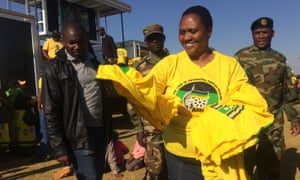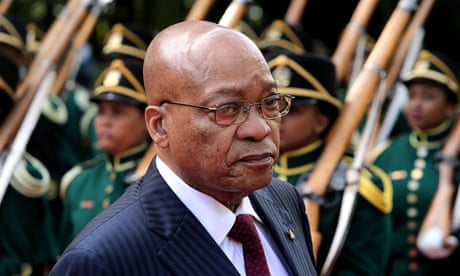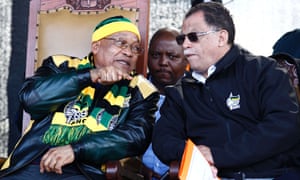'This is when we break the mould': South Africa at a political crossroads
In a Pretoria township, Jacob Zuma’s ANC is shoring up support before the polls open. But is the political map being redrawn?


Thoko Didiza, the ANC mayoral candidate for Pretoria, campaigning in the Soshanguve township.
The sun has risen over Soshanguve. It is winter in South Africa, which – if you are living in a poorly insulated, unheated house on the arid, elevated plains north of Pretoria – means cold and sleepless nights. Morning brings warmth and, these days, politicians.
On Wednesday, South Africa will go to the polls. Up to 26 million registered voters will decide who they want as mayors and local councillors – and possibly redraw the political map of the country when they do it.
For the first time since taking power in 1994, the African National Congress (ANC) may win less than 60% of the votes. The party may even lose control of the biggest cities. Surveys show the opposition Democratic Alliance (DA) – which calls for a total renewal of South African politics, but has so far had difficulty breaking out of its stronghold in the west of the country – ahead in the most important cities.
ANC officials have dismissed the polls. In Pretoria, Thoko Didiza, the ANC mayoral candidate, said she was confident of victory. “My campaign is going very well,” the 51-year-old former minister told the Guardian.
The DA candidate in the city saw things differently. “This is the moment when we break the mould,” said Solly Msimanga, 36.

South Africa: prosecutors head off new attempt to put Jacob Zuma on trial
The stakes are undoubtedly high. Losing control of cities such as Pretoria and Johannesburg would deal an enormous blow to the prestige of the ANC and deepen already profound unease about the leadership of Jacob Zuma, president of South Africa and of the party.
The ANC would also lose immense influence over the daily lives of around 14 million people and annual budgets of $10bn (£7.5bn). It would come as a profound psychological shock to many ANC officials. One recently told supporters that the party, which led the struggle against the apartheid regime through the 1970s and 1980s, had been “anointed by God”.
Pretoria, also known as Tshwane, is a city that sprawls. The contrast between life in the vast, high-walled mansions of wealthy neighbourhoods such as Waterkloof and in the townships is immense. There is chronic substance abuse and some of the highest levels of violent crime in the world.
But despite youth unemployment rates touching 36%, there is opportunity too, and the city attracts tens of thousands of migrants from rural areas and neighbouring countries every year. Many live in desperate squatter camps on the rim of Pretoria.
South Africa's 'Teflon president' survives another day, but scandal will stick eventually
Simon Allison
Soshanguve was established by the apartheid regime on an almost empty, flat plateau north of the city. Over 20 years, successive ANC administrations have built homes, streets and parks, and provided basic utilities. It is solid ANC territory, as was clear when Didiza’s convoy rolled into the centre of the township.
Local party functionaries warmed up the crowd with protest songs that have been ANC standards for more than 30 years. One refers to the armoured trucks used by apartheid police forces to brutally control the townships. The references were lost on Portia Chake, who didn’t understand the old slang name for the vehicles, but the 34-year-old knew the words to a second chant: “You can arrest us, beat us and we will never lie down.”
Didiza, wearing a T-shirt celebrating the foundation of the ANC 104 years ago, ran through her campaign speech, listing the achievements of the party. This strategy was predictable, experts said. “The ANC have been in power since 1994 and will naturally claim credit for all improvements since then. And there certainly has been a dramatic improvement in most people’s lives over the period as a whole,” said Gareth Newman, an expert in governance at the Institute for Security Studies (ISS) in Pretoria.
The sun has risen over Soshanguve. It is winter in South Africa, which – if you are living in a poorly insulated, unheated house on the arid, elevated plains north of Pretoria – means cold and sleepless nights. Morning brings warmth and, these days, politicians.
On Wednesday, South Africa will go to the polls. Up to 26 million registered voters will decide who they want as mayors and local councillors – and possibly redraw the political map of the country when they do it.
For the first time since taking power in 1994, the African National Congress (ANC) may win less than 60% of the votes. The party may even lose control of the biggest cities. Surveys show the opposition Democratic Alliance (DA) – which calls for a total renewal of South African politics, but has so far had difficulty breaking out of its stronghold in the west of the country – ahead in the most important cities.
ANC officials have dismissed the polls. In Pretoria, Thoko Didiza, the ANC mayoral candidate, said she was confident of victory. “My campaign is going very well,” the 51-year-old former minister told the Guardian.
The DA candidate in the city saw things differently. “This is the moment when we break the mould,” said Solly Msimanga, 36.

South Africa: prosecutors head off new attempt to put Jacob Zuma on trial
The stakes are undoubtedly high. Losing control of cities such as Pretoria and Johannesburg would deal an enormous blow to the prestige of the ANC and deepen already profound unease about the leadership of Jacob Zuma, president of South Africa and of the party.
The ANC would also lose immense influence over the daily lives of around 14 million people and annual budgets of $10bn (£7.5bn). It would come as a profound psychological shock to many ANC officials. One recently told supporters that the party, which led the struggle against the apartheid regime through the 1970s and 1980s, had been “anointed by God”.
Pretoria, also known as Tshwane, is a city that sprawls. The contrast between life in the vast, high-walled mansions of wealthy neighbourhoods such as Waterkloof and in the townships is immense. There is chronic substance abuse and some of the highest levels of violent crime in the world.
But despite youth unemployment rates touching 36%, there is opportunity too, and the city attracts tens of thousands of migrants from rural areas and neighbouring countries every year. Many live in desperate squatter camps on the rim of Pretoria.
South Africa's 'Teflon president' survives another day, but scandal will stick eventually
Simon Allison
Soshanguve was established by the apartheid regime on an almost empty, flat plateau north of the city. Over 20 years, successive ANC administrations have built homes, streets and parks, and provided basic utilities. It is solid ANC territory, as was clear when Didiza’s convoy rolled into the centre of the township.
Local party functionaries warmed up the crowd with protest songs that have been ANC standards for more than 30 years. One refers to the armoured trucks used by apartheid police forces to brutally control the townships. The references were lost on Portia Chake, who didn’t understand the old slang name for the vehicles, but the 34-year-old knew the words to a second chant: “You can arrest us, beat us and we will never lie down.”
Didiza, wearing a T-shirt celebrating the foundation of the ANC 104 years ago, ran through her campaign speech, listing the achievements of the party. This strategy was predictable, experts said. “The ANC have been in power since 1994 and will naturally claim credit for all improvements since then. And there certainly has been a dramatic improvement in most people’s lives over the period as a whole,” said Gareth Newman, an expert in governance at the Institute for Security Studies (ISS) in Pretoria.
The South African president, Jacob Zuma, with Danny Jordaan, the ANC mayor of Port Elizabeth. Photograph: Michael Sheehan/AFP/Getty Images
“But from 2009 the statistics don’t look so good. In fact, in some areas there is deterioration,” he added. Public protests have been multiplying. Four-fifths are non-violent, but there are still five or six violent demonstrations every day.
The ANC has many problems. One is infighting. Didiza’s nomination as candidate in Pretoria sparked lethal riots in Soshanguve and surrounding neighbourhoods. The outburst was now “all over”, said an aide. Then there are severe economic problems at the national level and successive controversies surrounding Zuma, whose approval ratings have slumped.
At a DA meeting in a poor area in central Pretoria, many potential voters said they would vote for the opposition party to protest against graft in government and in the ANC. “They have become thieves,” said Esme Mofokeng, a 44-year-old who has voted for the ANC in every previous poll. Zuma has been accused of alleged improper relations with a hugely wealthy business family and has been ordered to pay back state funds spent on improvements to his own home.
Mandela’s rainbow nation has gone from hero to zero. Can it reclaim his legacy?
Peter Hain
Didiza said voters she had met on the campaign trail were either unbothered by the charges against the party and Zuma, or did not believe them. Her view is backed up by pollsters who say the ANC’s record on delivery of basic services is key. While often of poor quality, houses, schools and clinics have been built and land rights continue to be a major concern.
Most expect the ANC to hold on to power, but with a reduced majority. “We are not really yet at a real tipping point, but we can expect a further decline in support. It will probably dip into the 50s for the first time in the democratic era,” said Newman, of the ISS.
The DA has its own problems. It is accused by critics of primarily representing the interests of South Africa’s white minority, but few neutral observers deny that the DA’s reputation for competent administration is broadly deserved. However, that may not be enough – just yet – to bring it to power.
Dio Kabelo, a 29-year-old in Soshanguve, explained why the ANC would get his vote. “I was born in the ANC. It means my life, it means freedom,” he said.
“But from 2009 the statistics don’t look so good. In fact, in some areas there is deterioration,” he added. Public protests have been multiplying. Four-fifths are non-violent, but there are still five or six violent demonstrations every day.
The ANC has many problems. One is infighting. Didiza’s nomination as candidate in Pretoria sparked lethal riots in Soshanguve and surrounding neighbourhoods. The outburst was now “all over”, said an aide. Then there are severe economic problems at the national level and successive controversies surrounding Zuma, whose approval ratings have slumped.
At a DA meeting in a poor area in central Pretoria, many potential voters said they would vote for the opposition party to protest against graft in government and in the ANC. “They have become thieves,” said Esme Mofokeng, a 44-year-old who has voted for the ANC in every previous poll. Zuma has been accused of alleged improper relations with a hugely wealthy business family and has been ordered to pay back state funds spent on improvements to his own home.
Mandela’s rainbow nation has gone from hero to zero. Can it reclaim his legacy?
Peter Hain
Didiza said voters she had met on the campaign trail were either unbothered by the charges against the party and Zuma, or did not believe them. Her view is backed up by pollsters who say the ANC’s record on delivery of basic services is key. While often of poor quality, houses, schools and clinics have been built and land rights continue to be a major concern.
Most expect the ANC to hold on to power, but with a reduced majority. “We are not really yet at a real tipping point, but we can expect a further decline in support. It will probably dip into the 50s for the first time in the democratic era,” said Newman, of the ISS.
The DA has its own problems. It is accused by critics of primarily representing the interests of South Africa’s white minority, but few neutral observers deny that the DA’s reputation for competent administration is broadly deserved. However, that may not be enough – just yet – to bring it to power.
Dio Kabelo, a 29-year-old in Soshanguve, explained why the ANC would get his vote. “I was born in the ANC. It means my life, it means freedom,” he said.

Comments
Post a Comment